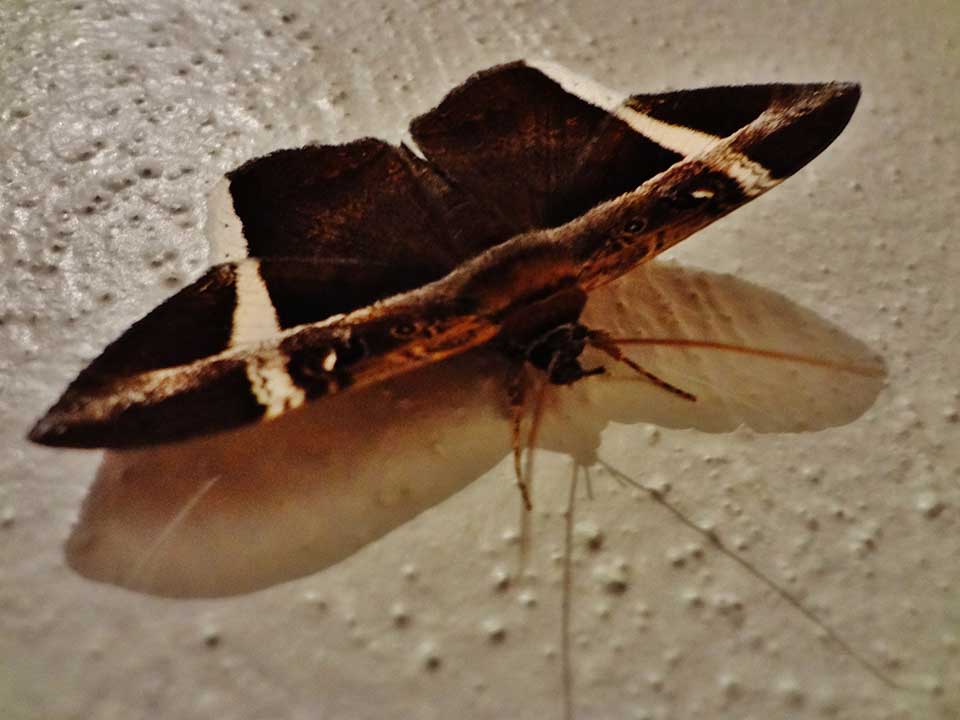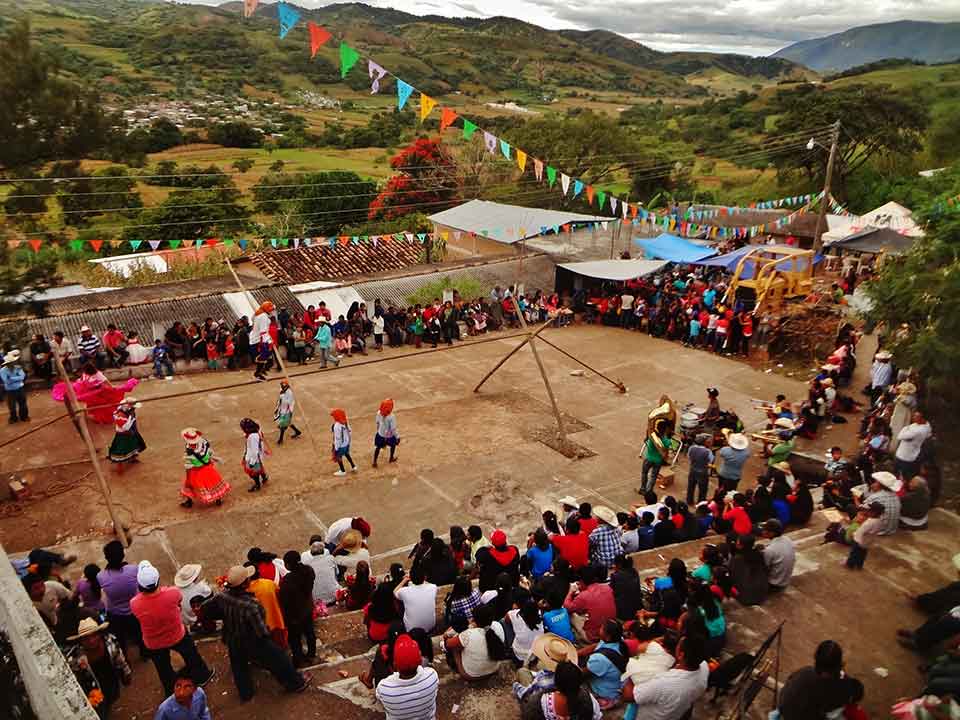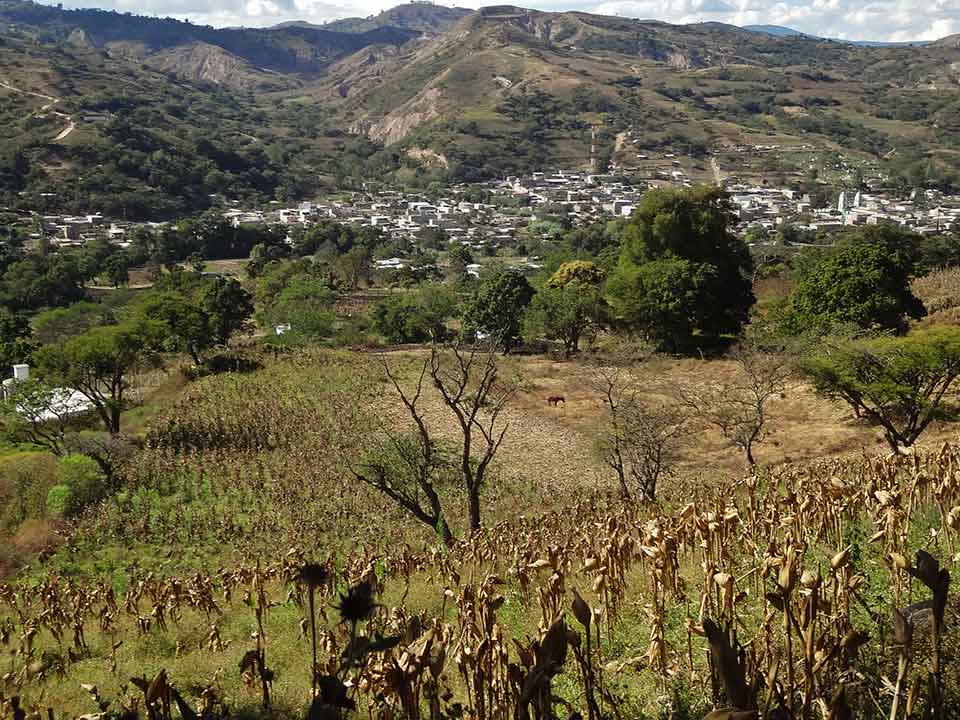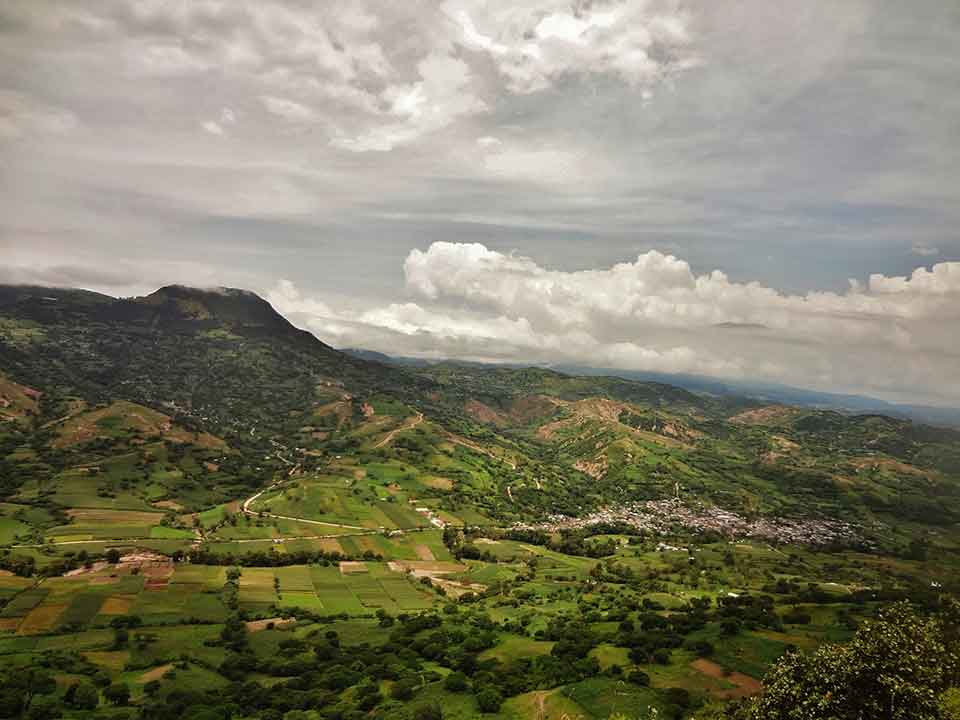Three Náhuatl Poems from Mexico
Tonalmeyotl is from Atzacoaloya, Chilapa de Álvarez, in the Mexican state of Guerrero / Photos courtesy of the author
My Náhuatl
They say my tongue Náhuatl
has had her head cut off,
her feet bound together
and her eyes swathed in gauze.
I, a man from Atzacoaloya,
will show otherwise:
Náhuatl has a head,
quick feet
and an insurmountable gaze.
I am sure
that Náhuatl walks
arms free, her soul
beating like the heart
of an oak forest.
Nonauatlajtol
Kijtouaj kampa notlajtol nauatl
yokechtejkej,
yokikxisalojkej
niman yokixtlapachojkej.
Najua uan niualeua Atsakualoyan,
niteititis kampa xmelauak.
Yajua kipiya itsontekontsin,
ikxiuan makajtokej
niman melauak tlacha uejka.
Najua nikmastika
kampa notlajtol nejneme,
kampa xtsasalijtokej imauan niman iyoltsin,
sa tsikuintok ken se aokokapostsintle.
Mi lengua náhuatl
Cuentan que a mi lengua náhuatl
le han cortado la cabeza,
amarrado los pies
y vendado los ojos.
Yo, un hombre de Atzacoaloya,
mostraré lo contrario,
ella tiene cabeza,
goza de pies ligeros
y una vista inalcanzable.
Estoy seguro
que camina,
que posee brazos libres y que su alma
palpita como el corazón de un encinal.
Attempt at Melody
Night falls, everything in its final throes.
There’s no birds, no wind
not even any dried-up leaves on the sidewalk.
The scent I pick up
with my man-dog nose
tells me to sing
to retrace the day’s history.
After poring over what I wrote,
I come to realize these melodies
are trying to pierce deaf ears,
to save eyes lost
and heal men
made impatient by society.
But time is short
and human walls
will not allow my song
to be a healing herb
because, if they did,
it would spread across the earth like a weed
and harm a broad, inhuman swath of society.
So, once again, I go back alone
in my attempt
to be heard.
Kuak nikneke ninokuikatis
Uetse tonajle niman noche najmanchiua.
Xnemej totomej, xnotlaloua ajakatsintle
nin kana patlanej xijtsitsintin ipan in chikaualistle.
Noyakajtsol ken se tlakachiche
nechilia maninokuikate
niman ninokuikatsia pampa maka nelkauas in tonajle.
Kema noyolika nikake nokualis
niman tlaka nokuikaluan
kinekej tenakastlaposkej,
teixtlaposkej
niman kinekej kinpajtiskej noche tlakamej
uan melauak kintlauelmiktsia kalmaseualtin.
Maske tej, tlaka on kauitl melauak pitelotsin
niman on tepantlakamej
xkauiliaj maueiya nokuikaltsin,
xkauiliaj manokuepa se xijtlapajtiketl
kampa kijtoua tla kauiliaj,
melauak miyak ualixuas ken ixua xijtle
niman kuajkon miyak tokniuan kinmakixtis,
kuajkon tej, oksejpa san ompa ninokaua,
kan niknektok ninokuikatis
niman xaka nechakake.
Intento de melodía
Cae el día y todo se vuelve agónico.
No hay pájaros, no hay viento
ni hojas secas sobre la vereda de la vida.
Mi olfato de hombre-perro
me pide que cante
para rememorar la historia del día.
Después de leer detenidamente mi propio canto,
me doy cuenta de que las melodías
tienen la intención de perforar oídos sordos,
de rescatar ojos perdidos
y de curar a hombres
impacientes ante la sociedad.
Sin embargo, el tiempo es corto
y las paredes humanas
no permiten que mi canto
sea una hierba curativa
porque, si se le permite,
se multiplicará como maleza sobre la tierra
y dañará a una gran parte de la sociedad inhumana.
Por ello, vuelvo a quedar
solo en el intento
de ser escuchado.

Bad Omen
Wake up, brothers: the messenger has arrived.
It’s tracing an errand across the wind.
Wake up, brothers, wake up!
Get moving, don’t give in to sleep.
I’m begging you—Wake up!
You all know full well: the coming of that moth-bird
is synonym of an imminent end.
Wake up, brothers, wake up!
Let’s drive this intruder out of the house.
Mekapapalotl*
Xtlachakan nokniuan kampa mekapapalotl yoyejkok.
Kintlapaluiya se tlajtojle ipan ajakatsintle.
¡Xtlachakan nokniuan, xtlachakan!
Xtlakojtilikan kampa kochilistle maka maimextlane.
Imechilia te, ¡xtlachakan!
Inkimastoke kampa itetlajpalojka on totopapalotl,
kijtoneske kampa yaka mikis.
Xtlachakan nokniuan, ¡xtlachakan!
Matikixtikan tochan in mekapapalotsintle.
* In Náhuatl, the title is Mekapapalotl: meka is a prefix meaning “death” and papalotl refers to a moth or butterfly; the species to which the mekapapalotl refers is pictured here, in a photo by Tonalmeyotl.
Mariposa de malagüero**
Despierten hermanos que la mensajera ha llegado.
Traza un recado sobre el viento.
¡Despierten hermanos, despierten!
Tomen fuerzas, que el sueño no los venza.
Se los suplico, ¡despierten!
Saben bien que la visita de esa ave-mariposa,
es sinónimo de un final próximo.
Despierten hermanos, ¡despierten!
Saquemos a esta intrusa de la casa.
** In Spanish, agüero means “omen” but also has noticeable resonances of the racialized slang word güero, i.e., “fair-skinned,” “blonde,” “white.”
Translator’s note: These translations are taken from Tonalmeyotl’s debut poetry collection, Tlalkatsajtsilistle (2016), which draws upon the classical Náhuatl tradition in order to address the devastating effects of colonization, narcoterrorism, climate change, and migration in Guerrero. Tonalmeyotl’s rendering of his hometown, Atzacoaloya, is highly particular and, at the same time, indexes communities all over the world in which unreliable natural cycles, lack of economic opportunity, and organized violence threaten to fragment long-standing social relations and formations, especially due to mass exodus abroad. At the same time, his poems explore the enriching potential of ongoing processes of cultural contact and transformation. At once archetypal and highly contemporary, Tlalkatsajtsilistle represents a significant literary achievement for its combined usage of the vernacular and prehispanic poetic forms. One prominent example is Tonalmeyotl’s iteration of the icnocuicatl (song of deprivation), described by Miguel León-Portilla as a lament in which the poet “questions what it is to live on earth, what love and death are, and what sort of truths are possible in language” (La Tinta negra y roja, p. 19). In Tonalmeyotl’s work, the social and ecological disasters serving as the occasions for each icnocuicatl are, in turn, counterbalanced by the constant reiteration that speakers of lenguas originarias and their transmission of ancestral knowledge represent alternatives to Western ways of being and knowing. Tlalkatsajtsilistle suggests it is the earth that sustains life, and life that fertilizes the imagination. The utopian “Attempt at Melody,” another icnocuicatl, figures poetry as a curative wild plant whose power is thwarted only by the imposition of human borders: “But time is short / and human walls / will not allow my singing / to be a healing herb / because, if they did, it would multiply across the earth like a weed / and harm a broad swath of inhuman society.”
Translations from the Spanish


















